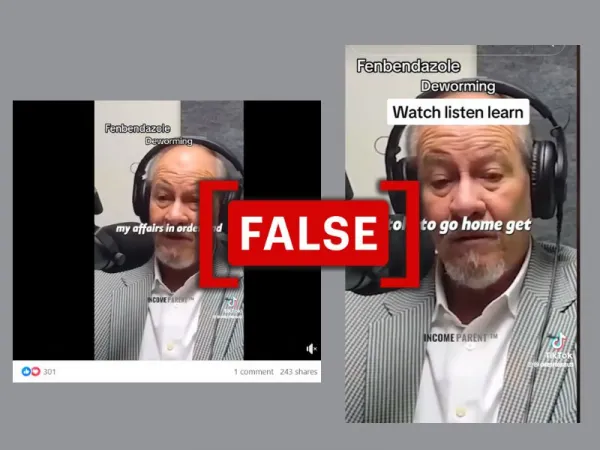By: Umme Kulsum
October 9 2023
 Screenshot of viral video claiming fenbendazole can cure cancer. (Source: Facebook/Screenshot/Modified by Logically Facts)
Screenshot of viral video claiming fenbendazole can cure cancer. (Source: Facebook/Screenshot/Modified by Logically Facts)
Researchers have cautioned against fenbendazole being used in humans because of its toxicity. There is not enough evidence that it can cure cancer.
What is the claim?
A video (archived here) shared on Facebook features a man talking about cancer and how a deworming medicine administered to animals "killed" cancer in mice. The video about the man's "cancer-cure" journey has caught a lot of attention recently and is being widely shared across social media platforms, including TikTok and X.
The man in the viral video says, "…I got a call from a large animal veterinarian in western Oklahoma, who is a college friend and a family friend. He told me this crazy story about a scientist at Merck on the veterinary side who has been doing cancer research on mice. She had hundreds of mice, and mice implanted cancer all over the body parts, brains, liver, lungs, pancreas, etc. Her mice population was down within intestinal parasites and she had no choice but to save her research. She gave all of her mice fenbendazole. If you went out to any zoo in the world, they bring in fenbendazole by a truckload front-end loader, head-high piles in bays because they give them that to every single animal kingdom. And she did, and unfortunately or fortunately for all of us, she also learned she accidentally killed all the cancer (sic)."
This Facebook post about fenbendazole, a deworming medicine, being a cancer cure had been shared by more than 260 users at the time of publishing this story. The video is also viral on TikTok with the same claim. One such post is archived here.
Screenshot of the video and claims on fenbendazole on social media. (Source: TikTok/Screenshot/Modified by Logically Facts)
However, no evidence supports the theory that fenbendazole is an effective human cancer treatment.
What did we find?
Upon investigation, we found that the man talking in the viral video is one Joe Tippens, who had shared his experience with a small-cell lung cancer treatment regimen involving fenbendazole in 2019. His controversial claim about complementary alternative medicine for cancer treatment was picked up by several people, including YouTube influencers, and had soon became a talking point in the South Korean cancer patient community.
South Korean cancer research experts then conducted a qualitative study on Tippens' claims, which was published by the National Center for Biotechnology Information (NCBI), part of the United States' National Library of Medicine, in October 2022. The study states that Tippens "was a participant in the Kitruda clinical trial at the MD Anderson Cancer Center, and his improvement was likely to be the effect of immuno-cancer drugs."
In another study, titled "Exceptional Repositioning of Dog Dewormer: Fenbendazole Fever," experts said, "Despite the potential anticancer capabilities of fenbendazole, its pharmacokinetics, safety, and tolerance profiles in humans must be confirmed in extensive clinical trials before it can be used in any therapeutic context." Researchers urged caution against the use of fenbendazole as a cancer cure.
According to another article by NCBI, titled: 'Anthelmintics as Potential Anti-Cancer Drugs?,' the Food and Drug Administration (FDA) and European Medicines Agency (EMA) "prohibit fenbendazole for human use." It further states, "There is no definite evidence of anti-cancer effects in human patients so far. Clinical trial with fenbendazole is impossible, because it is not permitted for human use due to toxicities."
Tippens' experience is insufficient to substantiate the assertion that fenbendazole cures cancer.
Fenbendazole for humans?
Fenbendazole is a medication commonly used for deworming in animals, but it is not approved for use in humans for any medical conditions.
Sheila Singh, director at the Centre for Discovery in Cancer Research at Canada's McMaster University, refutes claims that the deworming drug can cure cancer. In an interview with AFP, Singh said, "Seeing promising data in a dish of cancer cells is the beginning…But to say that something could cure cancer is simply unscientific because there's no data that backs up that claim whatsoever."
It is crucial to emphasize that the safety and efficacy of fenbendazole in humans is yet to be thoroughly studied through clinical trials. It is also essential to emphasize that cancer is complex and multifaceted. Effective cancer treatments are typically developed through rigorous scientific research, clinical trials, and regulatory approval processes.
Some studies in cell cultures and animal models suggest that fenbendazole may have anti-cancer effects. However, it's crucial to emphasize that evidence from cell culture and animal studies does not necessarily translate directly to humans.
The verdict
The effectiveness of fenbendazole, a medication used for deworming in animals, as a cancer treatment is not scientifically proven. The drug is believed to be toxic for humans, and claims about it being a cancer cure are false.